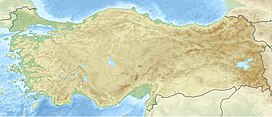Mount Sipylus
| Mount Spil | |
|---|---|
| Mount Sipylus | |

The "Weeping Rock" associated with Niobe in Mount Sipylus
|
|
| Highest point | |
| Elevation | 1,513 m (4,964 ft) see section |
| Coordinates | 38°34′02″N 27°27′17″E / 38.56722°N 27.45472°ECoordinates: 38°34′02″N 27°27′17″E / 38.56722°N 27.45472°E |
| Geography | |
| Geology | |
| Mountain type | Shield volcano |
Mount Spil (Turkish: Spil Dağı), the ancient Mount Sipylus (Ancient Greek: Σίπυλος) (elevation 1,513 m or 4,964 ft), is a mountain rich in legends and history in Manisa Province, Turkey, in what used to be the heartland of the Lydians and what is now Turkey's Aegean Region.
Its summit towers over the modern city of Manisa as well as over the road between İzmir and Manisa. The contiguous mass of Mount Yamanlar, also overlooking the Gulf of İzmir, has often been considered as an extension of Mount Sipylus massif with which it shares much history, although it is actually an extinct volcano and a distinct geographical formation.
The Manisa relief, a full faced statue carved into a cliff face is found near Mount Sipylus, several kilometers east of Manisa. It is traditionally identified as Cybele and dated to the late-Hittite or Luwian period in late second millennium BCE. The sculpture is known as Taş Suret in Turkish (meaning "Stone Figure") and sometimes referred to as such also in international literature. The mountain was considered a favorite haunt of the mother goddess. According to an old myth the sculpture was carved by Broteas, Tantalus' ugly son.
According to the Byzantine commentator John the Lydian, the unknown author of the 7th century BCE epic poem, the Titanomachy, placed the birth of Zeus, not in Crete, but in Lydia, which should signify Mount Sipylus.
...
Wikipedia

